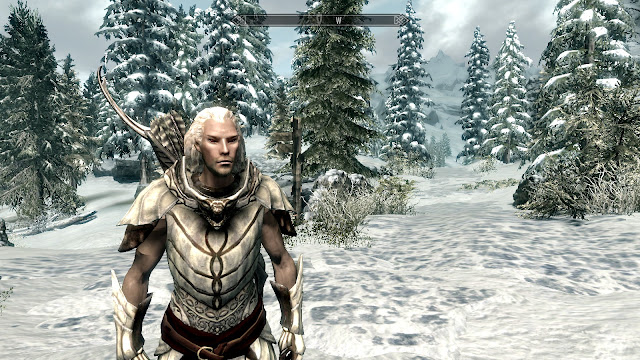Hearty Skyrim nostalgia
It’s hard to deal in absolutes. My friend often reminds me how her favourite novel is The Unbearable Lightness of Being, while I respond with incredulity at how hard I find it to even create a shortlist. Faced with the challenge of pinning down the indubitable be all and end all of literally anything - from books to music to contemptibly obscure French philosophers - is a struggle for me, as someone prone to near constant indecision. And yet, despite this quirk, there’s one superlative that I’ve always had an answer for.
My favourite video game is still, without a shadow of a doubt, The Elder Scrolls V: Skyrim.
Rather, I was reminded of Skyrim because of something that happened while I was away from home during the autumn of 2017. A burglar broke into my mum’s house and, weirdly, stole a sum total of zero (0) of her possessions. Upon hearing this down the phone, my mood shifted from one of apprehension to one of relative calmness, only abated when mum informed me that the burglar had in fact bothered to steal something of mine instead: the Xbox and each and every video game I had once purported to own.
The greatest casualty from this tragedy was a series of irrecoverable Skyrim saves across four characters that I had dreamed up, each with different motives and personalities. A sneaky cat bloke, a vampiric dark elf, a high elf with an irresponsible number of adopted children, and a Redguard called Juan. I’m not sure I have any way of getting those saves back, which is especially disappointing, because the most exciting thing ever to happen on my comparatively impersonal PC copy was the revelation that there was literally nothing to stop me from calling a Wood Elf “Crumpet Delacroix” and being done with it.
But etymological whimsy is not what enamoured me with Skyrim to begin with. In fact, it has nothing to do with why I feel Skyrim is the best game I’ve ever played. No - what Skyrim does, that no other game I’ve ever played has managed to do, is offer a very real, visceral even, sense of setting. Even writing down those words transports me away from Microsoft Word 2013 and back to the forests of Falkreath the player discovers immediately upon exiting the first dungeon of the game. The orchestral music swells – a potent thematic mix, in my eyes, of Hans Zimmer and Peter and the Wolf – and we traipse through engrossing meadows of thistle and fern to Riverwood. We, here, of course referring to me and the charming Ralof, because any self-professed expert knows that slaying Imperials nets more valuable armour in the first dungeon than killing those cheapskate Stormcloaks.
Perhaps most surprising is the fact that my ever-increasing knowledge of the inner workings of Skyrim – how to win almost every battle, destroying the local merchant economy, or even infinite levelling – never seemed to destroy, for my money, the sheer beauty of the world itself. Of course, as many a pundit is keen to point out, the world of Skyrim is intrinsically shallow, owing to its sheer size. Dungeons are often accused of following 'cookie-cutter' designs, and there's probably about three different species of tree on the entire map.
Happily, though, the size of Skyrim never compromised the integrity of the world. Every house has its interior, every mountain has its peak, and every NPC has their purpose (bar Nazeem).
It is, fundamentally, easier for a player to feel at home in a world that is consistent not only with the player's expectations but also those set by the game itself. Each interlocking part of the role-playing experience is contingent in Skyrim; the perks, expressed as constellations, feed into 'nordic' allusions followed through by the architecture and story, among other motifs. The consistency that Skyrim needs to work is a far greater demand than that placed on a linear story-driven game, where the player understands that, much like the edge of a set in a film, their interpretation of the world is set by the frontiers imposed by a director.
This is why I consider Half Life 2 to be a game with esteem similar to Skyrim; its sense of place and the motifs it uses do an exceedingly good job of carrying through everything one would expect of a post-apocalyptic Eastern European conurbation. However, Half Life 2 is full of locked doors and subtle pathways. Skyrim – by virtue of its extremely open design – necessitates complete consistency, both thematically and in terms of gameplay. The way it achieves such a thing, be it through engaging role-playing, awe-inspiring geography, or all-encompassing lore, will always impress me, even when the route to Riverwood is etched in my memory like Nordic runes on an iron dagger.
Before I finish, I should admit to not having played The Witcher 3. Many point to it as the solution to the problems that blighted Skyrim, and the natural evolution of the role-playing genre. Others can point to the myriad of increasingly similar Ubisoft games as a more economical way of pumping out enticing adventure games with RPG elements. The ongoing support for the Elder Scrolls Online and puritanical furore surrounding Fallout 4 suggest that the question of an Elder Scrolls VI is shifting further into mythology than even the series itself.
This suggestion frightens me. More than anything, it simply invites further indecision; I used to think my most anticipated sequel would always be Half Life 3, as it is for so many. But now, I’m not so sure. More than anything, I wish for a reinvigorated sense of wonder; a wonder that has remained unprovoked since I first glanced upon the forests of Falkreath. Oh, and dragons too I suppose.

Comments
Post a Comment